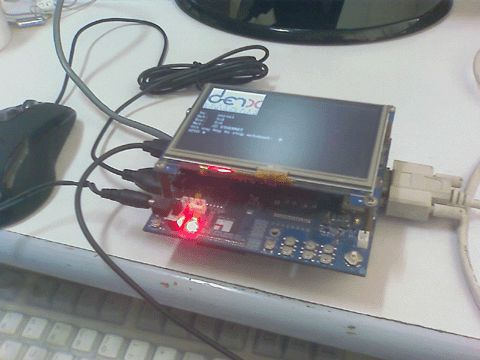君正4750开发板使用日记6-uCOS(minios)的开发配置试验
大半年没有搞君正的开发板了,最近总算有机会再试试JZ4750的uc/osII配置。也在此做个记录,供参阅。
ucos要在linux环境下编译,我仍是在windows下用VMWare UbuntuServer910虚拟机,用Putty连接登录后执行命令。我一开始并没有拿到了JZ4750的ucos的SDK(随机光盘上只有一个可烧录的DEMO),于是从君正官网的FTP里下载了Jz-uCOS-Development-guide.pdf、mipsel-4.1.2-nopic.tar.bz2、ucosii.tar等文件,然后将所有JZ的安装文件打包成ISO挂在虚拟机光驱上,按照Jz-uCOS-Development-guide.pdf里的说明,进行解压安装。
首先是挂载光盘,安装编译器工具链:
root@ubuntu:~# mkdir -p /opt
root@ubuntu:~# cd /opt
根据过去的经验,GCC等基本编译包是必须要装的:
root@ubuntu:/opt# apt-get install build-essential
...
root@ubuntu:/opt# mount /dev/cdrom /mnt
mount: block device /dev/sr0 is write-protected, mounting read-only
root@ubuntu:/opt# ls /mnt
ucosii.tar mipsel-4.1.2-nopic.tar.bz2
root@ubuntu:/opt# tar -xjf /mnt/mipsel-4.1.2-nopic.tar.bz2
root@ubuntu:/opt# ls
mipsel-4.1.2-nopic
root@ubuntu:/opt# mv mipsel-4.1.2-nopic mipsel-nopic
root@ubuntu:/opt# ls
mipsel-nopic
root@ubuntu:/opt#
然后是设置环境变量,写个hello.c程序来验证编译工具是否安装成功:
root@ubuntu:/opt# export GCC_EXEC_PREFIX=/opt/mipsel-nopic/lib/gcc/mipsel-linux/4.1.2/
root@ubuntu:/opt# export PATH=/opt/mipsel-nopic/bin:$PATH
root@ubuntu:/opt# vi hello.c
按I进入插入模式,输入以下内容,按ESC,输入wq保存退出:
#include <stdio.h>
int main()
{
printf("hello jz-mipsel-linux ucosii/r/n");
return 0;
}
root@ubuntu:/opt# mipsel-linux-gcc -o hello hello.c
mipsel-linux-gcc: error trying to exec 'cc1': execvp: No such file or directory
非常郁闷,居然连最简单的HELLO都编译失败。网上查一下,说可能是gcc没装好或路径不对,于是又下载重装更新,瞎折腾了一把,最后发现出错是因为被文档误导了,有GCC_EXEC_PREFIX的环境变量定义反而不行,将其删除即可:
root@ubuntu:/opt# export -n GCC_EXEC_PREFIX
root@ubuntu:/opt# mipsel-linux-gcc -o hello hello.c
...
/opt/mipsel-nopic/bin/../lib/gcc/mipsel-linux/4.1.2/../../../../mipsel-linux/bin/ld: /opt/mipsel-nopic/bin/../lib/gcc/mipsel-linux/4.1.2/crtend.o: warning: linking PIC files with non-PIC files
/opt/mipsel-nopic/bin/../lib/gcc/mipsel-linux/4.1.2/../../../../mipsel-linux/bin/ld: /opt/mipsel-nopic/bin/../lib/gcc/mipsel-linux/4.1.2/../../../../mipsel-linux/lib/crtn.o: warning: linking PIC files with non-PIC files
编译工具链装好了,接着解开ucosii的源码:
root@ubuntu:/opt# tar -xf /mnt/ucosii.tar
root@ubuntu:/opt# ls
hello hello.c mipsel-nopic ucosii
root@ubuntu:/opt# cd ucosii
root@ubuntu:/opt/ucosii# ls
audio cvs-up-dir.sh jz4740 lwip mips sample ucfs
CVS jz4730 LIBS madplay mmc src ucgui
root@ubuntu:/opt/ucosii#
按文档说明,我应该要进JZ4750目录编译,但显然此安装包里没有这个配置。不管那么多,先到JZ4740子目录编译一下:
root@ubuntu:/opt/ucosii# cd jz4740/
root@ubuntu:/opt/ucosii/jz4740# make
mipsel-linux-gcc -mips32 -O2 -mno-abicalls -fno-pic -fno-builtin -fno-exceptions -ffunction-sections -finit-priority -fomit-frame-pointer -msoft-float -G 0 -DJZ4740_PAV=1 -DCAMERA=0 -DUCGUI=1 -DUCFS=1 -DMMC=1 -DJPEG=1 -DTOUCH=2 -DJZ4740_PAV=1 -DDM=0 -I../src -I../jz4740/include -I../mips -I../jz4740 -I../jz4740/nand -DNAND=1 -DKEYTYPE=1 -I../jz4740/drv/key -DCODECTYPE=1 -I../jz4740/drv/codec -DRTCTYPE=1 -I../jz4740/drv/rtc -DLCDTYPE=1 -I../jz4740/drv/lcd -DTOUCH=2 -I../jz4740/drv/touch -I../mmc -I../ucfs -I../ucgui/Font -I../ucgui/LCDDriver -I../ucgui/Config -I../ucgui/Core -I../ucgui/ConvertColor -I../ucgui/WM -I../ucgui/Widget -I../ucgui/MemDev -I../ucgui/JPEG -DUDC=1 -DNAND_UDC_DISK=1 -DRAM_UDC_DISK=0 -I../jz4740/udc_new/udc_bus -I../jz4740/udc_new/udc_dma -I../jz4740/udc_new/mass_storage -I../jz4740/udc_new/block/ramdisk -I../jz4740/udc_new/block/nanddisk -I../madplay/libmad-0.15.1b -I../madplay/libid3tag-0.15.1b -D_ASSEMBLER_ -D__ASSEMBLY__ -o head.o -c head.S
cc1: error: unrecognized command line option "-finit-priority"
make: *** [head.o] Error 1
root@ubuntu:/opt/ucosii/jz4740#
这下搞不掂了,重新下载了另一个编译工具链mipsel-linux-gcc412-glibc236-nopic-sf-20101020.tar.bz2一样不行,改makefile把此选项去掉,又有别的错误。折腾了半天,还是不行,最后放弃了这个网上的版本。
然后打电话给君正的技术支持重新要一个ucos的SDK。JZ的人员素质很高,很快就答应了,一会就传了个minios SDK过来。SDK附带一个minios sdk使用说明.pdf,看了此文档后,才知道原来ucos的开发是需要先做资源,包括def、img、str、font和开机画面等,生成res.bin和ResID.h,以及def_boot.bin、img_boot.bin,然后把ResID.h复制到源码目录加入编译。烧录时可以多个bin一起烧进去。
这次我拿到的是一个多媒体播放的SDK配置,其主目录为mtv_50,首先仍是解压安装:
root@ubuntu:/opt# tar -xf /mnt/minios.tar
root@ubuntu:/opt# ls
hello hello.c minios mipsel-4.1.2-nopic ucosII ucosii-old
root@ubuntu:/opt# cd minios/
root@ubuntu:/opt/minios# ls
dcdv inc jzfs midware miniclib mtv_50 sample soc_src src
按照文档说明,把mxu_as文件复制到编译工具目录:
root@ubuntu:/opt/minios# cd mtv_50/tools
root@ubuntu:/opt/minios/mtv_50/tools# ls
big5_tools crc32.c gb18030_tools ksc_tools Makefile mxu_as
root@ubuntu:/opt/minios/mtv_50/tools# cp mxu_as /opt/mipsel-nopic/bin/
然后编译nandboot:
root@ubuntu:/opt/minios/mtv_50/tools# cd ..
root@ubuntu:/opt/minios/mtv_50# cd ../soc_src/jz4755/nandboot/
root@ubuntu:/opt/minios/soc_src/jz4755/nandboot# make clean
rm -fr *.o nand.elf clock.o debug.o nandboot.o nandlib.o core *.sym *.map *.dump nand.bin *.lib
root@ubuntu:/opt/minios/soc_src/jz4755/nandboot# make
mipsel-linux-gcc -mips32 -O2 -mno-abicalls -fno-pic -fno-builtin -fno-exceptions -ffunction-sections -Wall -Werror -fomit-frame-pointer -msoft-float -G 0 -DSOC_GENERATION=4755 -DUARTQUERY=2 -DHAVE_DCDV=0 -DPLATFORM_CETUS -DPLATFORM_CETUS_4750L -DIMAGE_DECODE_MEM_LEN="(4*1024*1024)" -DAUDIO_DECODE_MEM_LEN="(5*1024*1024)" -DAUDIOTAG_MEM_SIZE="(5*1024*1024)" -DLCD16BPP=0 -DLCD32BPP=1 -DSCREEN_W=480 -DSCREEN_H=272 -DVIDEOMAXMEM=0x81fffc00 -DLCD_TYPE_BPP_32 -DNOT_SUPPORT_TVOUT -DTVOUTTYPE=0 -I../../../soc_src/jz4755/include -I../../../src -I../../../soc_src/jz4755/nandboot -D_ASSEMBLER_ -D__ASSEMBLY__ -o start.o -c start.S
...
mipsel-linux-gcc -nostdlib -T u-boot-nand.lds -o nand.elf start.o clock.o debug.o nandboot.o nandlib.o -lstdc++ -lc -lm -lgcc
mipsel-linux-objcopy -O binary nand.elf nand.bin
mipsel-linux-objdump -d nand.elf > nand.dump
mipsel-linux-nm nand.elf | sort > nand.sym
mipsel-linux-objdump -h nand.elf > nand.map
root@ubuntu:/opt/minios/soc_src/jz4755/nandboot#
一次成功,难得。接着清理并编译主BIN:
root@ubuntu:/opt/minios/soc_src/jz4755/nandboot# cd /opt/minios/mtv_50/
root@ubuntu:/opt/minios/mtv_50# make cleanall
#cd ;make clean;#cd ../mtv_50;
make[1]: Entering directory `/opt/minios/mtv_50/desktop'
make[2]: Entering directory `/opt/minios/mtv_50/desktop/simpleness'
rm -fr ../../../mtv_50/desktop/simpleness/rel
...
rm -f *~ *.o ../../../soc_src/LIBS/mass_lib.a depend
make[1]: Leaving directory `/opt/minios/soc_src/common/mass_lib'
root@ubuntu:/opt/minios/mtv_50#
root@ubuntu:/opt/minios/mtv_50# make build
...
../../mtv_50/genlds ../../mtv_50/video/rel/video.elf.obj ../../mtv_50/target/mobile_tv.lds > mobile_tv.lds
../../mtv_50/genlds: 4: gawk: not found
make[1]: *** [../../mtv_50/video/rel/video.elf] Error 127
make[1]: Leaving directory `/opt/minios/mtv_50/video'
make: *** [../mtv_50/video] Error 2
root@ubuntu:/opt/minios/mtv_50#
不出所料又杯具了。不过还好,是缺了gawk这个包,将它装上就是了:
root@ubuntu:/opt/minios/mtv_50# apt-get install gawk
Reading package lists... Done
Building dependency tree
Reading state information... Done
The following NEW packages will be installed:
gawk
0 upgraded, 1 newly installed, 0 to remove and 43 not upgraded.
Need to get 525kB of archives.
After this operation, 2,122kB of additional disk space will be used.
Get:1 http://us.archive.ubuntu.com karmic/main gawk 1:3.1.6.dfsg-0ubuntu2 [525kB]
Fetched 525kB in 4s (114kB/s)
Selecting previously deselected package gawk.
(Reading database ... 40315 files and directories currently installed.)
Unpacking gawk (from .../gawk_1%3a3.1.6.dfsg-0ubuntu2_i386.deb) ...
Processing triggers for install-info ...
Processing triggers for man-db ...
Setting up gawk (1:3.1.6.dfsg-0ubuntu2) ...
root@ubuntu:/opt/minios/mtv_50#
这次终于编译通过了:
root@ubuntu:/opt/minios/mtv_50# make build
...
head:----------------------------------
name = desktoplib_drawer.bin
nand = 6954
start = 0x80451000
size = 12160
---------------------------------------
head:----------------------------------
name = desktoplib_tradition.bin
nand = 6960
start = 0x80451000
size = 8728
---------------------------------------
Total File Count 62 Link File Count 62!
make: [app] Error 1 (ignored)
make: [app] Error 1 (ignored)
cp -f HostLink/minios.bin ../../
root@ubuntu:/opt/minios/mtv_50#
其输出文件minios.bin在/opt下:
root@ubuntu:/opt/minios/mtv_50# cd ../../
root@ubuntu:/opt# ls -l
total 14504
-rwxr-xr-x 1 root root 572102 2010-12-07 02:44 hello
-rw-r--r-- 1 root root 105 2010-12-07 02:44 hello.c
drwxrwxrwx 11 root root 4096 2010-04-14 03:15 minios
-rw-r--r-- 1 root root 14264320 2010-12-07 05:00 minios.bin
drwxr-xr-x 10 508 500 4096 2008-03-25 00:52 mipsel-nopic
root@ubuntu:/opt#
文档上还需要编译minios/loader,但我没有这个目录。搜一下,最后发现在minios/mtv_50/loader目录下,于是编译之:
root@ubuntu:/opt/minios/mtv_50# cd loader
root@ubuntu:/opt/minios/mtv_50/loader# make clean
rm -fr ../../mtv_50/loader/target
root@ubuntu:/opt/minios/mtv_50/loader# make
Compile: ../../soc_src/common/kernel_lib/head.S
Compile: ../../miniclib/libc_s.S
Compile: ../../soc_src/jz4755/kernel/clock.c
...
144 0 0 144 90 os_dbg.o (ex ../../src/minios.a)
2216 0 20496 22712 58b8 os_cpu_a.o (ex ../../src/minios.a)
148272 1632 49600 199504 30b50 (TOTALS)
text data bss dec hex filename
150896 1688 82532 235116 3966c ../../mtv_50/loader/target/loader.elf
150896 1688 82532 235116 3966c (TOTALS)
root@ubuntu:/opt/minios/mtv_50/loader#
接下来就是将所有BIN文件拷到烧录目录下,执行烧录了。
至此基本上把JZ4750的主要几种系统的开发模式都浅尝试验过了,都没有做深入的软硬件配置和应用开发,但感觉还是比较复杂。君正在UCOS上的资料还是太少,网上的源码包和文档都太久不更新过于陈旧,离开了技术支持绝对是不行的,对原厂商依赖性太强,需要提供较多的服务支持,这对其方案应用的发展来说显然是有限制的。
顺便解释一下这里所谓的minios与uC/OS的关系,其实minios一般就是硬件方案厂商在uC/OS的基础上作了移植开发增强功能的结果。移植的意思是从一种硬件架构移到另一种,因为不同的硬件方案中CPU指令、寄存器、时钟中断、数据类型等都不同,所以需要移植修改。比如凌阳的开发板会附带一个凌阳从uC/OS移植过来的minios;我拿到的这个minios,其实是君正在uC/OS II的基础上移植开发的。
